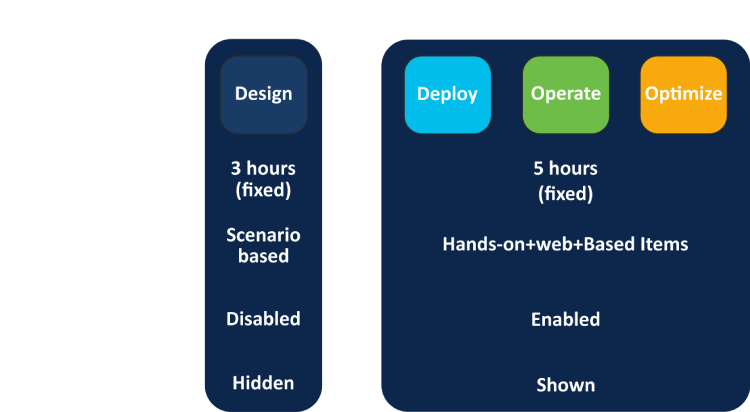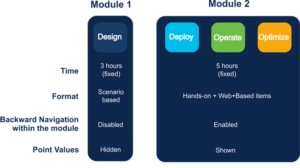Key Features

Training Mode
Classroom and Online

Learning Method
Lecture & Self-Study

Lecture & Self-Study
1 Month

Training Hours
3 Hours per day

Hands on Labs
Yes

Study Material
Yes

Certificate
Yes

Batches
(Mon-Thu) & (Sat-Sun)
CCIE Datacenter Course Overview
Achieving CCIE Data Center certification proves your skills with complex data center solutions. To earn CCIE Data Center certification, you pass two exams: a qualifying exam that covers core data center technologies, and a hands-on lab exam that covers data center networks through the entire network lifecycle, from designing and deploying to operating and optimizing.
- Sr. DataCenter engineer
- Lead Consulting systems engineer
- Sr. Technical solutions architect
- L3 Network designe
There are no formal prerequisites for CCIE Data Center, but you should have a good understanding of the exam topics before taking the exam.
CCIE candidates are recommended to have five to seven years of experience with designing, deploying, operating and optimizing data center technologies and solutions prior to taking the exam.
All Cisco certifications are valid for 3 years.
Pass a qualifying exam
CCIE DATACENTER Syllabus
Implementing and Administering CCIE DATACENTER Course
- 2 month of Instructor-led classroom training
- 2 month of Virtual instructor-led group online training
- 25 days of 1-on-1 training (It saves your time as you get a personal trainer for the entire duration of the boot camp.)
Who are eligible for this course ?
- Network engineers with Core exam – Implementing Cisco Data Center Core Technologies (DCCOR 350-601). This is the CCIE Data Center written exam which is valid as a qualifying exam for CCIE Data Center lab exam v3.0
- Network engineer with at least five to seven years of professional experience with designing, deploying, operating and optimizing Cisco Data Center technologies
- Network engineers need to use an expert-level problem solving process that includes options analysis to support complex Data Center technologies and topologies
- Datacenter designers that design and support complex Data Center technologies and topologies
- Students and professionals in the IT and Technologies sector who wish to enhance their knowledge and acquire an internationally recognized professional certification which can improve their job prospects
Course Outline
Upon completion of this course, candidates will have the skills and knowledge to implement:
- Implement routing and switching protocols in Data Center environment
- Implement overlay networks in data center
- Introduce high-level Cisco Application Centric Infrastructure (Cisco ACI™) concepts and Cisco Virtual Machine manager (VMM) domain integration
- Describe Cisco Cloud Service and deployment models
- Implement Fibre Channel fabric
- Implement Fibre Channel over Ethernet (FCoE) unified fabric
- Implement security features in data center
- Implement software management and infrastructure monitoring
- Implement Cisco UCS Fabric Interconnect and Server abstraction
- Implement SAN connectivity for Cisco Unified Computing System™ (Cisco UCS®)
- Describe Cisco HyperFlex™ infrastructure concepts and benefits
- Implement Cisco automation and scripting tools in data center
- Evaluate automation and orchestration technologies
- Configure Overlay Transport Visualization (OTV)
- Configure Virtual Extensible LAN (VXLAN)
- Explore the Cisco ACI Fabric
- Implement Cisco ACI Tenant Policies
- Integrate Cisco ACI with VMware
- Configure Fibre Channel
- Configure Device Aliases
- Configure Zoning
- Configure NPV
- Configure FCoE
- Configure Server and Uplink Ports
- Configure VLANs
- Configure a Cisco UCS Server Profile Using Hardware Identities
- Configure a Cisco UCS Service Profile Using Pools
- Configure an Internet Small Computer Systems Interface (ISCSI) Service Profile
- Program a Cisco Nexus Switch with Python
- Validate Fabric Discovery
- Configure Network Time Protocol (NTP)
- Create Access Policies and Virtual Port Channel (vPC)
- Enable Layer 2 Connectivity in the Same Endpoint Group (EPG)
- Enable Inter-EPG Layer 2 Connectivity
- Enable Inter-EPG Layer 3 Connectivity
- Compare Traffic Forwarding Methods in a Bridge Domain
- Configure External Layer 2 (L2Out) Connection
- Configure External Layer 3 (L3Out) Connection
- Integrate Application Policy Infrastructure Controller (APIC) With VMware vCenter Using VMware Distributed Virtual Switch (DVS)
- Set Up DCNM
- Explore DCNM-SAN Client and DCNM Device Manager
- Configure and Use RBAC
- Configure and Use RBAC with DCNM-SAN Client and Device Manager
- Manage VSANs and Fibre Channel Domain
- Configure NPV and N-Port Identification Virtualization (NPIV)
- Configure Interfaces
- Configure Device Aliases and Zoning
- Explore and Automate with NX-API
- Perform Slow Drain Analysis with Cisco DCNM
- Configure SAN Analysis and SAN Telemetry Streaming
- Configure FCIP Tunnels and FCIP High Availability (HA)
- Configure IVR for SAN Extension
- Troubleshoot Zoning and Zone Merges
- Design Virtual Port Channels
- Design First Hop Redundancy Protocol (FHRP)
- Design Routing Protocols
- Design Data Center Topology for a Customer
- Design Data Center Interconnect Using Cisco OTV
- Design Your VXLAN Network
- Create a Cisco FEX Design
- Design Management and Orchestration in a Cisco UCS Solution
- Design a Fibre Channel Network
- Design and Integrate an FCoE Solution
- Design a Secure SAN
- Design Cisco UCS Director for Storage Networking
- Design a Cisco UCS Domain and Fabric Interconnect Cabling
- Design a Cisco UCS C-Series Server Implementation
- Design Cisco UCS Fabric Interconnect Network and Storage Connectivity
- Design Systemwide Parameters in a Cisco UCS Solution
- Design an LDAP Integration with a Cisco UCS Domain
- Design Pools for Service Profiles in a Cisco UCS Solution
- Design Network-Specific Adapters and Policies in a Cisco UCS Solution
- Designing Enterprise Connectivity
- Designing an Enterprise Network with BGP Internet Connectivity
- Designing an Enterprise Campus LAN
- Designing Resilient Enterprise WAN
- Designing QoS in an Enterprise Network
- Designing an Enterprise IPv6 Network
- Use Cisco APIC Web GUI
- Discover the Cisco APIC REST API
- Use Postman with the APIC REST API
- Use Python with the Cisco APIC REST API
- Configure and Verify Cisco ACI Using Acitoolkit
- Use Cobra and Arya to Recreate a Tenant
- Manage Configuration Using Ansible
- Set Up a New Tenant the NetDevOps Way
- Create an Infrastructure Health Report
- Install an Application from the App Center on the Cisco APIC
- Power on Auto Provisioning on the Cisco Nexus 9000
- Use Bash and Guest-Shell on Cisco NX-OS
- Use Python to Enhance CLI Commands
- Trigger a Python Script Using Cisco Embedded Event Manager (EEM)
- Docker Containers on NX-OS
- Configure and Verify Using NX-API and Python
- Configure and Verify Using NETCONF/YANG
- Use Ansible with NX-OS
- Streaming Telemetry
- Connect, Query, and Modify Cisco UCS Manager Objects Using Cisco UCS PowerTool
- Discovery 21: Connect, Query, and Modify Cisco UCS Integrated Management Controller (IMC) Objects Using Cisco IMC PowerTool
- Utilize Cisco UCS Python Software Development Kit (SDK)
- Utilize Cisco IMC Python SDK
- Implement Ansible Playbooks to Modify and Verify the Configuration of Cisco UCS Manager
What to expect in the lab exam?
The 8 hours practical exam will assess candidate’s skills through the entire network lifecycle of designing, deploying, operating and optimizing complex network scenarios. The exam consists out of 2 modules that are fixed in time and will be delivered in a fixed sequence:
The goal of this module is to measure ability to create, analyze, validate and optimize network designs, which is the base for all deployment activities. Candidates will need to:
- Understand capabilities of different technologies, solutions and services
- Translate customer requirements into solutions
- Assess readiness to support proposed solutions
The module is scenario-based, without access to any devices. Candidates will be provided with a set of documentation required to discern before answering web-based items.
Examples of documentation include email threads, high-level design, network topology diagrams, customer requirements and restrictions, etc. Examples of web-based items include Drag-and-Drop, Multiple-Choice-Single-Answer, Multiple-Choice-Multiple-Answer, Dropdown items, etc.
During this module backward navigation will be disabled. As such, candidates will not have full visibility on all questions within this module. Points value(s) associated to each item are not displayed within this module.
Module 2: Deploy, Operate and Optimize (5 hours)

What devices are used during practice?
The practical exam tests candidates on solutions that can be configured using the below Equipment and software versions. Candidates may see more recent software versions during their attempt but will only be tested on features that are supported in the list below.
Passing the exam requires a depth of understanding difficult to obtain without hands-on experience. Early in your preparation you should arrange access to equipment and software similar to that used on the exam.
- APIC cluster
- Nexus 9336 ACI Spine Switch
- Nexus 9332 ACI Spine Switch
- Nexus 9372 Switch
- Nexus 93180 Switch
- Nexus 93108 Switch
- Nexus 7004 Switch
- Supervisor 2 Enhanced
- 48-Port 10-Gb Ethernet SFP/SFP+ (F3 module)
- Nexus 5672 Switch
- Nexus 2348 Fabric Extender
- UCS C220 M4 Series Rack Server
- Virtual interface card (VIC) for C-Series
- UCS-6248 Fabric Interconnect
- UCS 5108 Blade Server Chassis
- B200 M4 Blade Server
- Cisco Virtual Interface Card
- VIC 1340
- Dual Attached JBOD
- Cisco Catalyst 3750 Switch
- Cisco 2911/K9 terminal Server
- Cisco NX-OS v8.x on Nexus 7000 switches
- Cisco NX-OS v7.x on Nexus 5000 switches
- Cisco NX-OS v9.x on Nexus 9000 switches
- Cisco UCS Manager Release 3.x Fabric Interconnect
- Cisco Application Policy Infrastructure Controller 3.x
- Cisco Data Center Network Manager 11
- Cisco Integrated Management Controller 3.x
- Cisco UCS Director 6.x
- Active Directory: Windows Server 2016
- Test PC: Windows 10
- Cisco Jabber for Windows 12.5.1
Do you provide Placement Assistance, post completion of the training?
We are 100% committed to offer placement assistance to our students. Industry approved Resume Templates are provided to candidates as guidance to assist them in writing their resumes. We also provide students with FAQ interview questionnaire to help them prepare for their job interviews
What is expected salary after the CCIE Datacenter Training Course?
On an average a CCIE Datacenter Certified Engineer with 5 plus years of experience gets salary in the range of INR 1,50,000 (1.5 Lac) per month in India
After CCIE Datacenter training course, what is the Next Step?
Learning never stops. We always recommend CCIE Devnet (Course link) training. There is huge demand for CCIE Datacenter certified Engineers in market. These training and certification will establish your authority as an industry expert and provide you better career opportunities in the market.
Course Objectives
This course helps you prepare for the Cisco® CCNP® Data Center and CCIE® Data Center certifications for advanced-level data center roles. In this course, you will master the skills and technologies you need to implement data center compute, LAN and SAN infrastructure. You will also learn the essentials of automation and security in data centers. You will gain hands-on experience deploying, securing, operating, and maintaining Cisco data center infrastructure including: Cisco MDS Switches and Cisco Nexus Switches; Cisco Unified Computing System™ (Cisco UCS®) B-Series Blade Servers, and Cisco UCS C-Series Rack Servers. This course also earns you 64 Continuing Education (CE) credits towards recertification..
This course will help you:
- Create, Analyze, Validate and Optimize network designs, which is the base for all deployment activities
- Understand the capabilities of different technologies, solutions, and services
- Translate customer requirements into solutions
- Assess readiness to support proposed solutions
- Deploying, operating and optimizing network technologies and solutions
- As a CCIE (Cisco Certified Internetwork Expert), you can position yourself as a technical leader in the dynamic world of enterprise networks
- With the CCIE Data Center certification, you get to combine technical expertise with design skills which can add tremendous value to your skill sets
- CCIE certification enhances your skills across the lifecycle of the enterprise Data Center infrastructure right from design, deploy, operate and optimize stages
- New age technological needs of networking automation and network programmability are part of the CCIE certification. CCIE acquires these essential skill sets in the form of CCIE certification
- Incremental recognition is an attractive feature of CCIE certification revamp. You need to clear the qualifying exam and CCIE lab. Passing qualifying exam (DCCOR 350-601) entitles you to a specialist certification. It means, after clearing the qualifying exam and lab exam, you get CCIE certificate and specialist certification
- Adding a CCIE certification badge on your social media platforms gives you instant recognition and increases the visibility of your profile

Training Outline
- Network Principles
- Understanding and Troubleshooting Layer 2
- IGP Routing – RIP, EIGRP, OSPF
- BGP
- IPv6
- VPN Technologies
- IP Multicast
- QoS
- Infrastructure Security
- IP Services
- Infrastructure Services
- Software-Defined infrastructure deployments
- Cisco SD-Access solutions and deployment
- Cisco SD-WAN solution and deployment
- Cisco SD-WAN edge deployment
- Infrastructure Automation and Programmability
- Automation and scripting
- Data encoding formats
- Interaction with vManage API
- Deploy and verify model-driven telemetry
After taking this course, you should be able to:
- Create, analyze, validate and optimize network designs, which is the base for all deployment activities
- Understand the capabilities of different technologies, solutions, and services
- Translate customer requirements into solutions
- Assess readiness to support proposed solutions
- Deploying, operating and optimizing network technologies and solutions
- As a CCIE (Cisco Certified Internetwork Expert), you can position yourself as a technical leader in the dynamic world of Datacenter networks
- With the CCIE Datacenter certification , you get to combine technical expertise with design skills which can add tremendous value to your skillsets
- CCIE certification enhances your skills across the lifecycle of the Datacenter right from design, deploy, operate and optimize stages
- New age technological needs of networking automation and network programmability are part of the CCIE certification. CCIE acquires these essential skillsets in the form of CCIE certification
- Incremental recognition is an attractive feature of CCIE certification revamp. You need to clear the qualifying exam and CCIE lab. Passing qualifying exam (ENCOR 350-401) entitles you to a specialist certification. It means, after clearing the qualifying exam and lab exam, you get CCIE certificate and specialist certification
- Adding a CCIE certification badge on your social media platforms gives you instant recognition and increases the visibility of your profiles
- What is CCIE Datacenter v1.0 Course Curriculum?
- Our CCIE training has been designed & developed adhering to latest Cisco Blueprint and includes all modules of CCIE Datacenter Exam
Exam & Training
| Exam Name | Exam Code | Duration | Cost | Registration |
| CCIE Enterprise Infrastructure v1.0 | – | 8 Hours | 1600 USD | CCIE Portal |
Training Plan & Schedule
Classroom
| Date | Course | Batch | Register |
| 05 December 2022 | CCIE Datacenter | Weekdays (Mon-Fri) | Enquire now |
| 11 December 2022 | CCIE Datacenter | Weekend (Sat-Sun) | Enquire now |
| 19 December 2022 | CCIE Datacenter | Weekdays (Mon-Fri) | Enquire now |
| 25 December 2022 | CCIE Datacenter | Weekend (Sat-Sun) | Enquire now |
Virtual Classroom
| Date | Course | Batch | Register |
| 05 December 2022 | CCIE Datacenter | Weekdays (Mon-Fri) | Enquire now |
| 11 December 2022 | CCIE Datacenter | Weekend (Sat-Sun) | Enquire now |
| 19 December 2022 | CCIE Datacenter | Weekdays (Mon-Fri) | Enquire now |
| 25 December 2022 | CCIE Datacenter | Weekend (Sat-Sun) | Enquire now |
CCIE Datacenter Success Stories
I recently participated in a CCIE Training course from Mumbai Networks and I must say that I was thoroughly impressed with the quality of the program. The course was well organized and the content was comprehensive and up-to-date. The instructor was extremely knowledgeable and provided helpful insights throughout the course. I was able to understand the concepts clearly and gain valuable skills and information. I would highly recommend CCIE Training to anyone looking to take their IT career to the next level.
I recently completed the CCIE Training course and I'm incredibly impressed with the quality of the content from Mumbai Networks. The instructors did an excellent job of breaking down complex topics into easily digestible concepts. They also provided plenty of practical exercises to ensure that I was able to apply the knowledge to real-world scenarios. The course also made sure to cover all of the topics that I needed to know in order to become a CCIE certified professional. I would highly recommend this course to anyone looking to gain more technical knowledge and certification.
Recently took Mumbai Networks CCIE Training program and I am extremely pleased with the results. The instructors were knowledgeable and professional, the course material was comprehensive and well-structured, and the support staff were always available to answer any questions that I had. Throughout the program, I was able to develop my technical skills and gain a better understanding of the technology. I would highly recommend this program to anyone looking to pursue a career in networking.
Attended a CCIE Training course with Mumbai Networks and I'm so glad I did. The instructors were experienced and knowledgeable, and the course material was comprehensive and well thought out. The labs were challenging yet manageable, and I learned a great deal of valuable information throughout the course. I really appreciate the hands-on learning approach that CCIE Training offers, and I highly recommend their courses to anyone looking to gain a deeper understanding of networking technologies.
The course materials were easy to follow and the instructors were knowledgeable and experienced. The course was well laid out and the course material was comprehensive and up-to-date. I was also pleased with the personalized support I received from the instructors. I would definitely recommend Mumbai Networks CCIE Training to anyone looking for a comprehensive course to gain their certification.
Completed CCIE Training with Mumbai Networks and was very impressed with the quality of the material and instruction. The instructor was well-versed in the subject matter and was able to provide real-world examples to illustrate the concepts. The course was very comprehensive, covering topics such as networking protocols, routing, switching, and security. I was also able to take advantage of the lab environment and practice the concepts I had learned in the course. Overall, I'm very pleased with the quality of the CCIE Training course and would highly recommend it to anyone looking for a comprehensive training program.
FAQ on CCIE Datacenter
Once you clear the technology core exam (DCCOR 350-601), you can clear the CCIE lab exam within 3 years of passing the qualifying technology core exam. Plus if you can pass the corresponding technology concentration exam, you will get CCNP certificate too.
Yes, the same written exam serves as the core exam for CCNP certification and CCIE certification
The CCIE lab format will change to assess candidates’ skills through the entire adoption lifecycle of designing, deploying, operating, and optimizing complex network scenarios. The lab exam consists of 2 modules that are fixed in time and will be delivered in a fixed sequence:
- Module 1: Design (3 hours)
- Module 2: Deploy, Operate and Optimize (5 hours)
Automation and Network Programmability skills are an integral part of both modules.










